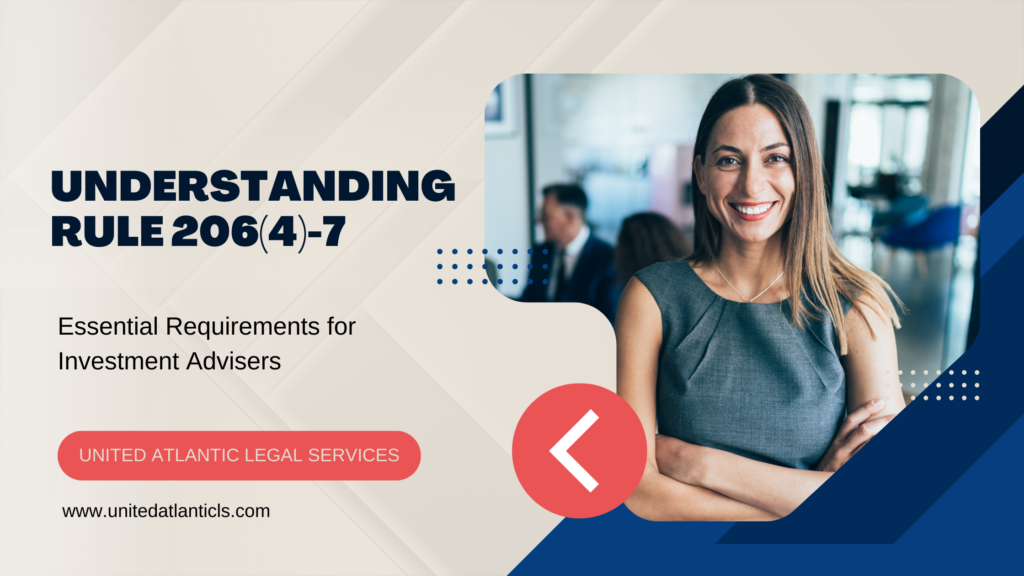
Today United Atlantic Legal Services discusses the essential requirements of Rule 206(4)-7 for investment advisers. Thank you for joining us!
In the intricate world of financial advisory services, regulatory compliance is not just a legal obligation – it’s a cornerstone of building trust with clients and ensuring the integrity of the industry. Investment advisers play a pivotal role in guiding clients through the complexities of investing, and one of the key regulatory measures that they must adhere to is Rule 206(4)-7. Let’s delve into the requirements of this rule and understand why they are crucial for investment advisers.
You can learn more about Rule 206(4)-7 by clicking on the video below and visiting our YouTube channel.
Understanding Rule 206(4)-7: The Compliance Rule
Rule 206(4)-7, also known as the “Compliance Rule,” is a significant component of the Investment Advisers Act of 1940. The primary objective of this rule is to establish a framework for investment advisers to create, implement, and maintain effective compliance programs. These programs are designed to prevent violations of federal securities laws and maintain the highest standards of professionalism and ethical conduct.
Breaking Down the Three Key Requirements
- Written Policies and Procedures: Investment advisers are required to establish comprehensive written policies and procedures. These policies should be reasonably designed to prevent violations of securities laws, encompassing all aspects of their operations, including portfolio management, trading practices, advertising, and more.
- Annual Review: Rule 206(4)-7 mandates investment advisers to conduct an annual review of their compliance policies and procedures. This review serves as a proactive measure to ensure that the established framework remains relevant, effective, and adaptable to changes in regulations and the financial landscape.
- Designation of a Chief Compliance Officer (CCO): Investment advisers must appoint a Chief Compliance Officer (CCO) responsible for overseeing the firm’s compliance program. The CCO plays a vital role in implementing and enforcing the policies and procedures, acting as a bridge between regulatory requirements and the day-to-day operations.
The Benefits of Rule 206(4)-7 Compliance
- Client Trust and Confidence: A robust compliance program builds confidence among clients, assuring them that their interests are paramount. Clients are more likely to trust advisers who are transparent and committed to adhering to regulatory standards.
- Mitigating Risks: By proactively identifying and addressing potential violations, investment advisers can significantly reduce risks associated with regulatory non-compliance. This can prevent legal consequences and damage to the firm’s reputation.
- Operational Efficiency: An effective compliance program streamlines operations by providing a structured framework for decision-making. This, in turn, enhances operational efficiency and reduces the chances of errors or oversights.
Tips for Establishing an Effective Compliance Program
- Tailored Approach: Craft your compliance program to fit the specific size, complexity, and business model of your firm. Avoid adopting a generic approach that might not align with your firm’s unique characteristics.
- Regular Training: Regularly train your team members on compliance policies and procedures. This keeps everyone informed and equipped to uphold the highest standards of conduct.
- Stay Current: Stay vigilant about regulatory changes and industry best practices. Regularly update your compliance program to ensure it remains aligned with the evolving landscape.
In conclusion, Rule 206(4)-7 is a cornerstone of ethical and professional conduct for investment advisers. By adhering to its requirements, investment advisers not only comply with legal obligations but also demonstrate a commitment to the well-being of their clients and the integrity of the financial industry as a whole. This dedication to compliance sets the stage for trust, growth, and long-term success.
About the Author

Michael Rasmussen is the founder of United Atlantic Legal Services. He is a licensed attorney in Florida and registered solicitor in the United Kingdom. Michael has acted as General Counsel and Chief Compliance Officer to several investment advisers, including private fund managers, responsible for the management of billions of dollars in client assets.
Michael is also the founder of FinProLaw, an online learning platform where Michael has created courses designed for investment adviser compliance professionals. These courses include:
- Investment Adviser Compliance Essential for Chief Compliance Officers
- Foundations of Investment Adviser Compliance
- What is a “Security”?
- Investment Adviser Marketing Rule
- Regulation A – Exemption from Registration
- Regulation Crowdfunding – Exemption from Registration
- Regulation D – Exemption from Registration
Michael can also be found on LinkedIn.
Investment adviser firms who are also clients of United Atlantic Legal Services can receive many of these courses at a significantly reduced fee or, in some cases, at no expense. Contact us today or visit the FinProLaw to learn more.